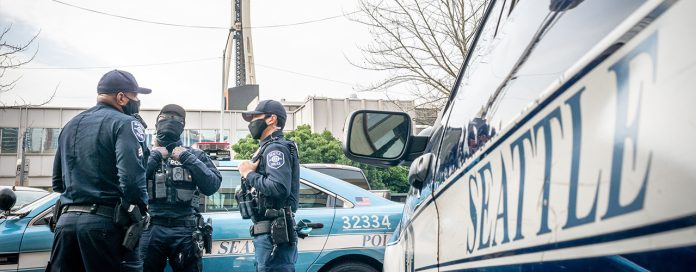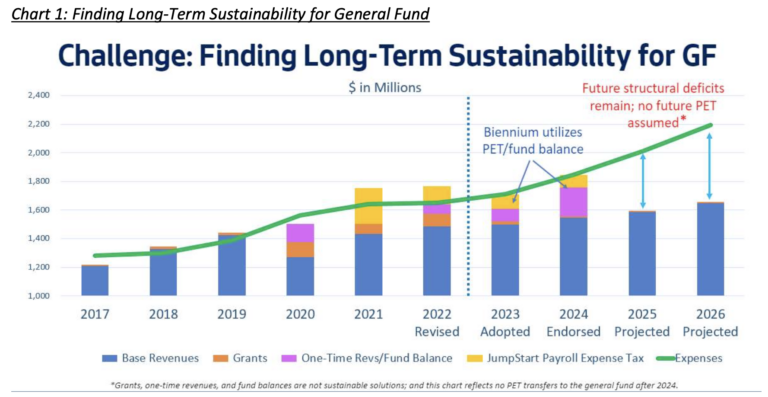
Mayor Harrell’s contract would make Seattle police the highest paid in the region, but no more accountable.
The long-awaited new proposed contract between the City of Seattle and the Seattle Police Officers Guild (SPOG) has been released, and police accountability advocates are viewing it as a slap in the face.
In a baffling move, the City is proposing a new contract that will have already expired at the time of its passage; it will cover the period of time between January 6, 2021 and December 31, 2023. The old contract expired on December 31, 2020. Why the discrepancy of start and ending dates? I think we all remember that on January 6, 2021, out of all the police departments in the country, the Seattle Police Department (SPD) had the most officers attending the infamous rally in Washington D.C. that preceded the insurrection that sought to overturn the 2020 election result.
But this is just the first of many troubling questions surrounding this contract.
Financial impacts to the City
Under this new contract, should it be approved, SPOG members would be receiving a cumulative 23% raise, consisting of a 1.3% raise for 2021, a 6.4% raise for 2022, and a whopping 15.3% raise for 2023. Officers will be receiving back pay to account for these raises. The last SPOG contract, approved in 2018, gave officers a 17% raise and required the city to spend $65 million in back pay.
The new contract would also increase medical insurance premium payments for SPOG members from 80% to 95% and add two new paid holidays to the roster: Juneteenth and Indigenous Peoples’ Day, which some may find ironic given that SPD continues to stop and frisk Black and Indigenous people at much higher rates. SPOG members will also still receive a 2% premium if required to wear body worn cameras and they will continue to receive the special events bonus to overtime outlined in last year’s MOU.
In addition to an as-yet-unknown amount of back pay owed, this 23% raise is also expected to impact the 2025 budget deficit, which is already estimated to be $241 million, taking into account the recently approved contract with the Coalition of City Unions. And we can expect to see the overall portion of the city’s general fund that is spent on SPD continue to balloon, which has the effect of defunding investments in other areas, which could include housing, transportation, social services, and gun violence prevention programs.

But in a move that is bound to make councilmembers happy, the new raise would result in SPD officers being the highest paid in the region, which the City Council believes is crucial for officer recruitment and retention. However, it is unclear whether some officers might just be waiting for this final pay day before retiring, which could instead end up causing a higher level of attrition while saddling the City with higher pension costs.
No improvements to accountability
For reform advocates, the most egregious part of this new contract remains its complete disinterest in rectifying large gaps in officer accountability that have been identified by advocates, the Community Police Commission (CPC), and even U.S. District Court Judge James Robart, who is overseeing the Department of Justice’s consent decree with the city.
None of the accountability issues listed in my previous article have undergone any meaningful improvements. In the proposed contract, the 180-day clock is given a small adjustment to account for criminal investigations of officers, and the Office of Police Accountability (OPA) will be allowed to hire an additional two civilian investigators while still being required to maintain its full roster of sworn investigators. Aside from issues of compensation, there are very few changes between this contract and the previous one.
Judge Robart was clear in his written ruling last September that, given the city fell partway out of compliance with the consent decree due to their 2018 contract with SPOG, he expected to review the next collective bargaining agreement before releasing the city in full from its obligations under the decree: “In order to evaluate whether the City has achieved sustained compliance with those areas of the Consent Decree that remain open, it is critical for the court to understand whether and how the outcome of the collective bargaining process affects SPD’s accountability and review systems.”
The city is required to file a report with the court within 30 days of reaching a tentative agreement with SPOG that analyzes the contract’s impact on SPD accountability and review systems, as well as how it affects the implementation of the 2017 Accountability Ordinance. The clock began ticking on Saturday, March 30.
To be clear, this new proposed contract blocks implementation of the 2017 Accountability Ordinance as fully as its predecessor. It is hard to imagine the judge will approve of how the city is abdicating its responsibility for accountability by agreeing to these terms.
What contract says on civilianizing duties
The new contract also includes a new Memorandum of Understanding (MOU) that provides a list of duties that non-sworn employees of SPD will be allowed to carry out. These 18 duties cover work as wide-ranging as delivering messages (except death messages), automated safety camera traffic enforcement (provided the current five sworn positions remain), and responding to requests for transportation (again, with some limits.) Civilians would also be allowed to respond to some lost or missing property calls, nuisance noise complaints, and property damage calls within certain parameters.
Noteworthy in this list is the item regarding wellness checks. The MOU with SPOG passed last year allowed the new Community Assisted Response and Engagement (CARE) team to respond to two call types: person down and wellness checks. This new MOU places additional restrictions on wellness check response, saying civilians can only respond to these calls “where the identified individual known to the caller does not have any history of or current suicidal ideations, significant health problems including mental health, history of or fighting addiction, history of or concerns of domestic abuse, or is living in one of the City’s ‘wet houses.’”
Some advocates are concerned these additional parameters could mean wellness checks able to be performed by CARE civilian responders will be few and far between. Indeed, this definition appears to preclude the idea of an alternate civilian emergency response to mental health crises, a policy strongly supported by Seattleites.
Strategic Implications
When it comes to police guild bargaining, cities tend to provide raises and other benefits in return for gains in accountability. However, this new SPOG contract, which only runs through the end of 2023, breaks that mold, giving SPOG members a significant pay hike while making no progress on the accountability front.
As PubliCola first reported, the next SPOG contract after this new one, which would cover 2024 and beyond, is currently in mediation. If mediation were to fail, the likely next step would be interest arbitration, which would result in a final and binding decision on the contract. Given recent gains in accountability in both the Seattle Police Management Association and King County Police Officers Guild contracts, an arbitrator’s decision could potentially be more favorable to the city than was previously thought.
That being said, both mediation and interest arbitration can be lengthy, time-consuming processes. And the city has just given up a significant amount of leverage in its negotiations with SPOG. It is anyone’s guess when this next contract could be finalized, whether it will make any significant gains in accountability, and how much more that might cost.
Meanwhile, the current proposed contract still needs to be voted on by SPOG membership. If approved, it would then move to the City Council for a final vote.

This is the first proposed SPOG contract after the long summer of protest against police brutality in 2020. SPOG’s Vice President Daniel Auderer made international news by mocking the death of Jaahnavi Kandula, who had been run over and killed by a fellow SPD officer, and that’s just the beginning of a long list of similar, egregious incidents involving SPD over the last few years. We even have Seattle Times columnist Danny Westneat writing last fall about SPOG as “armed agents of the government using the safety of the public as a bargaining chip” and suggesting Seattle decertify the union.
But what is the city’s actual concrete response to the continual scandals that rock SPD? A contract that prioritizes giving officers high wages without even a nod to common sense accountability.
This new contract sends a clear message: that consent decrees are not an effective answer to toxic police department cultures and that police accountability is no longer a priority for our electeds here in Seattle.
Amy Sundberg is the publisher of Notes from the Emerald City, a weekly newsletter on Seattle politics and policy with a particular focus on public safety, police accountability, and the criminal legal system. She also writes science fiction, fantasy, and horror novels. She is particularly fond of Seattle’s parks, where she can often be found walking her little dog.

